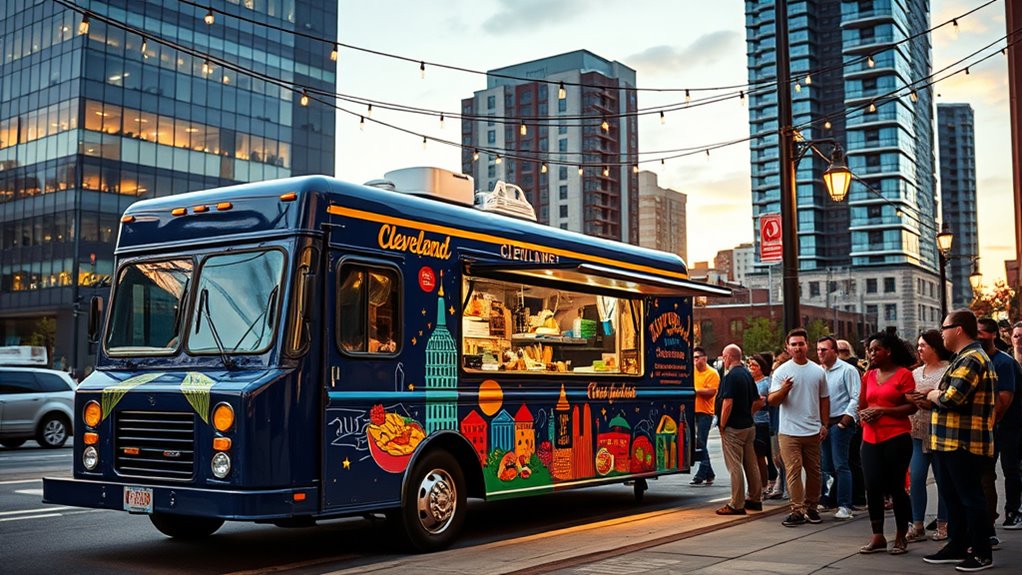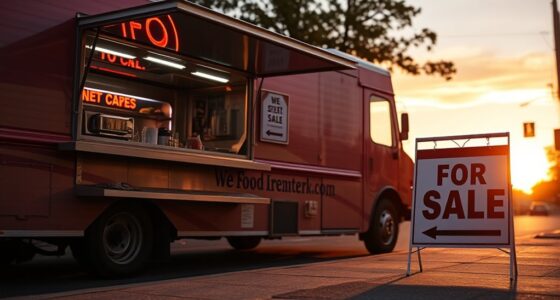To start a food truck in Cleveland, you should understand the local food scene, including popular neighborhoods and events, and incorporate Cleveland’s flavors into your branding. Make sure to obtain the necessary permits, licenses, and follow sanitation protocols, while choosing a shared kitchen if possible. Budget smartly, design a menu that highlights regional ingredients, and engage with the community through social media and local festivals. Continue exploring how to navigate Cleveland’s regulations and grow your food truck business successfully.
Key Takeaways
- Research Cleveland’s popular neighborhoods, festivals, and hotspots to identify high-traffic locations and tailor your food truck branding accordingly.
- Complete online permit applications, adhere to sanitation protocols, and operate within designated vending zones to ensure legal compliance.
- Obtain shared kitchen licenses, secure insurance, and plan your budget with funding options like local grants and microloans.
- Develop a menu featuring local flavors, utilize social media, and participate in community events to build brand awareness and customer loyalty.
- Stay updated on city regulations, network with local vendors, and incorporate trending ingredients and techniques for ongoing success.
Starting With Local Food Scene
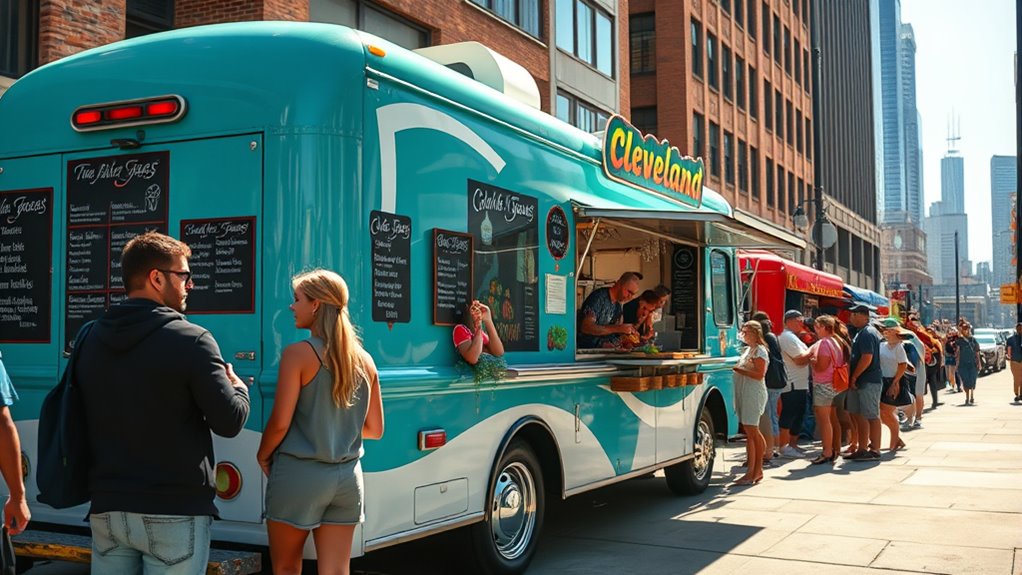
To successfully start a food truck in Cleveland, you should begin by immersing yourself in the local food scene. Explore popular eateries, food festivals, and neighborhood gatherings to understand what residents love. This insight helps you craft effective food truck branding that resonates with Cleveland’s unique culture. Use social media marketing to connect with local food enthusiasts and build buzz around your truck’s concept. Share behind-the-scenes content, menu updates, and customer stories to create a loyal following. Pay attention to local tastes and trends, adjusting your offerings accordingly. Engaging with the community through these channels not only boosts visibility but also helps you gather feedback. Incorporating knowledge of local preferences and sound vibrations can also inspire creative ways to enhance your food truck’s atmosphere or presentation. Starting strong with local insights guarantees your food truck becomes a staple in Cleveland’s vibrant culinary landscape.
Understanding Local Requirements
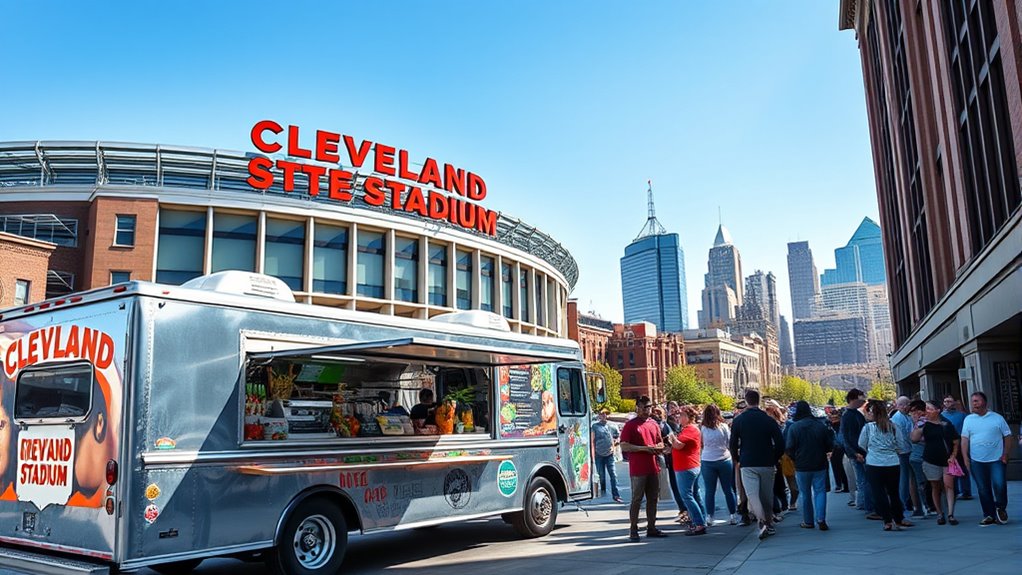
To operate legally, you’ll need to understand Cleveland’s permit application process, which is managed online. You also must follow sanitation protocols and keep detailed records to stay compliant. Additionally, you should be aware of designated street vending zones to ensure you’re setting up in authorized areas. Be sure to review local regulations on license and permit requirements to fully understand the legal obligations involved.
Online Permit Application Procedures
Getting through Cleveland’s online permit application process is a crucial step toward launching your food truck. To start, visit the city’s official website and locate the online permit section. The application procedures are straightforward but require careful attention. You’ll need to provide detailed information about your food truck, including ownership documents, a menu overview, and proof of insurance. Make sure to review all requirements before submitting your online permit application to avoid delays. The system typically allows you to upload supporting documents directly. Once submitted, you’ll receive a confirmation email, and the city will review your application. If additional information is needed, you’ll be notified promptly. Completing this online permit process efficiently gets you one step closer to hitting Cleveland’s streets with your food truck.
Sanitation Protocols and Recordkeeping
After submitting your online permit application, it’s important to familiarize yourself with Cleveland’s sanitation protocols and recordkeeping requirements. You’ll need to set up proper handwashing stations on your truck to meet health standards and ensure staff can wash hands frequently. Regular sanitation training is essential so everyone understands cleaning procedures, safe food handling, and hygiene practices. Keep detailed records of daily cleaning schedules, temperature logs, and staff sanitation training sessions. These records demonstrate compliance during health inspections and help prevent contamination. Cleveland’s health department emphasizes strict adherence to sanitation protocols to safeguard public health. By maintaining organized records and following protocols diligently, you’ll stay compliant, build customer trust, and avoid potential fines or shutdowns.
Designated Street Vending Zones
Understanding Cleveland’s designated street vending zones is essential for operating legally and avoiding penalties. The city’s zoning regulations specify where you can set up your food truck, ensuring your street vending activities comply with local laws. Before you start, review these zones carefully to identify permitted areas. Violating zoning rules can lead to fines or license suspension, so precise knowledge is vital. Here’s a quick overview of Cleveland’s vending zones:
| Zone Type | Description |
|---|---|
| Downtown District | High foot traffic, prime for vending |
| Commercial Corridors | Main streets with retail focus |
| Residential Neighborhoods | Limited vending, check restrictions |
| Event Districts | Temporary vending during events |
| Waterfront Areas | Popular for tourists, regulated |
Always verify current regulations with local authorities before setting up.
Setting Up Your Base of Operations
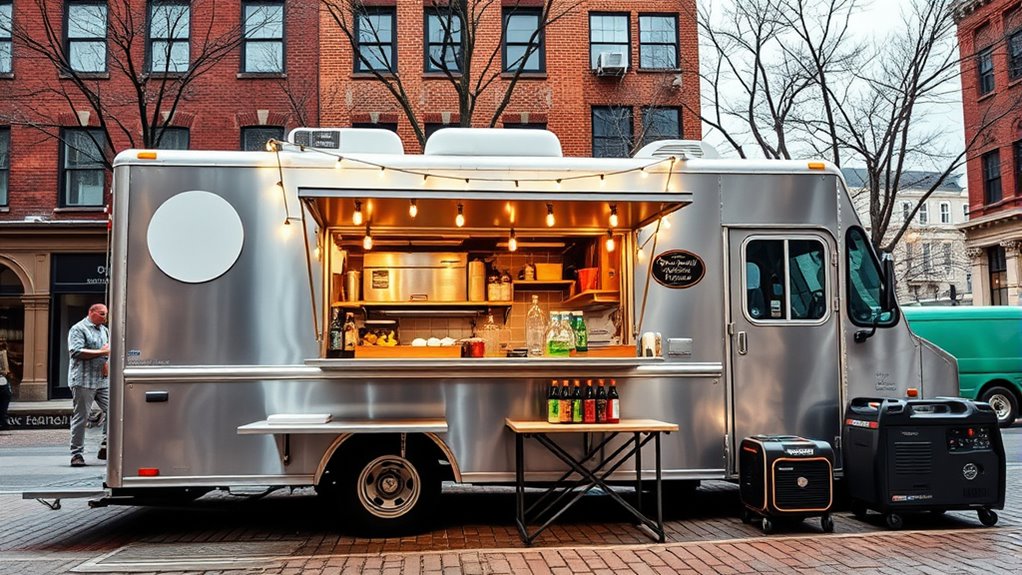
To set up your base of operations, you’ll need to take into account shared kitchen licensing requirements in Cleveland and make sure you meet all local regulations. Planning your kitchen layout carefully will help maximize efficiency and stay compliant. Making these decisions early sets a strong foundation for your food truck’s success. Incorporating effective sound design techniques can also enhance your branding and customer experience on-site.
Shared Kitchen Licensing Requirements
Setting up your food truck’s base of operations in Cleveland requires obtaining the appropriate shared kitchen licensing. A shared kitchen, often operated as a food truck co-op, provides a compliant space to prepare your menu items. To qualify, you’ll need to meet local health department standards and apply for shared kitchen licensing through Cleveland’s health department. This licensing ensures your operations conform to safety and sanitation regulations. Joining a food truck co-op can also offer benefits like shared equipment, reduced costs, and collaborative support. Make sure the shared kitchen you choose is properly licensed and inspected, and that your operations align with all local food safety laws. This step is essential to legally operate within Cleveland’s vibrant food scene.
Custom Kitchen Layout Planning
Designing your kitchen layout is a crucial step that directly impacts your food truck’s efficiency and compliance. You need to carefully plan where each piece of kitchen equipment will go to maximize workflow and safety. Prioritize layout ergonomics so you can move smoothly between prep stations, cooking areas, and storage. Efficient placement of appliances like grills, fryers, and sinks reduces unnecessary movement and speeds up service. Consider your menu and how to optimize space for both storage and preparation. Use compact, multi-functional kitchen equipment to save room. Ensuring your layout complies with local health regulations is essential. A well-thought-out design makes your kitchen more productive, minimizes clutter, and creates a safer working environment for you and your staff.
Budgeting and Financing Your Food Truck
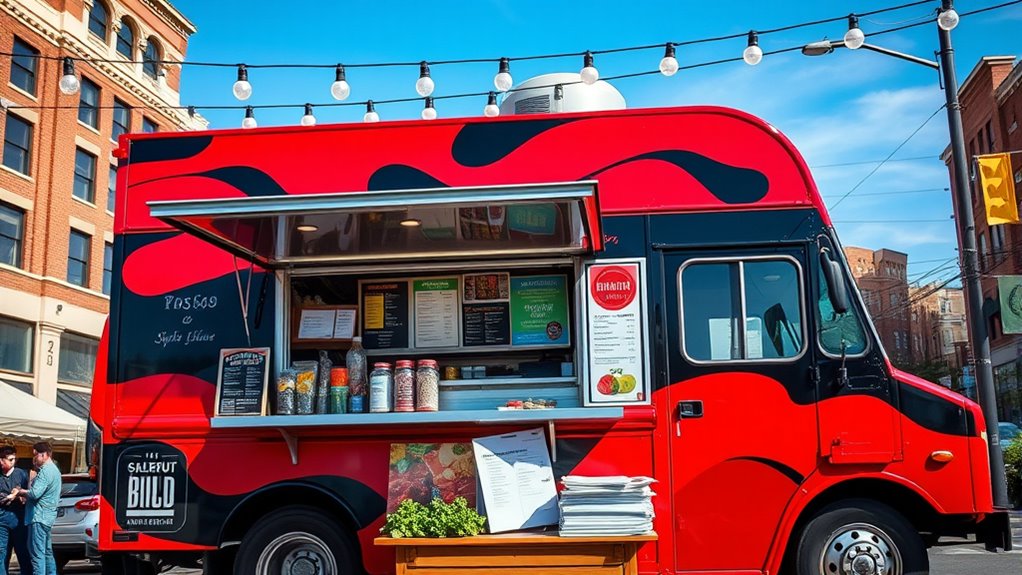
To start your food truck journey, you need to contemplate your initial vehicle costs and how you’ll finance the purchase. Local programs in Cleveland can help you find affordable financing options, making it easier to get started. Don’t forget to budget for liability coverage to protect your business as you roll out your new venture. Incorporating cost-effective skincare solutions, such as eye patches, can also be a helpful addition to your self-care routine during busy days.
Initial Vehicle Purchase Costs
Buying your food truck is a significant upfront expense that requires careful budgeting. The initial vehicle purchase costs can vary widely based on whether you choose a new or used truck, with prices typically ranging from $50,000 to $150,000. Beyond the purchase price, you’ll need to consider ongoing expenses like vehicle maintenance, which is essential to keep your truck running smoothly and avoid costly repairs. Additionally, insurance requirements are a critical part of your budget; you’ll need extensive coverage to protect against accidents, theft, and liability. Properly accounting for these costs ensures you’re prepared for the financial responsibilities of operating a food truck in Cleveland. Being aware of these factors helps you make informed decisions and stay within your financial plan from the start.
Local Food Truck Financing Programs
Securing funding is a crucial step in launching your food truck in Cleveland, and fortunately, there are several local funding programs designed to help entrepreneurs like you. These programs can assist with the costs of obtaining food truck permits and covering startup expenses. By tapping into local funding, you can access favorable terms tailored to small businesses and food vendors in Cleveland.
Some options to explore include:
- Small Business Development Center grants
- Local economic development loans
- Community reinvestment initiatives
- Microloan programs for food entrepreneurs
Researching these programs can give you the financial boost needed to get your food truck on the road. Be sure to review eligibility criteria and application deadlines to maximize your chances of securing the funding you need.
Liability Coverage for Food Trucks
Liability coverage is an essential component of budgeting and financing your food truck, as it protects you from potential legal and financial setbacks. Understanding insurance requirements is crucial, as most cities, including Cleveland, mandate specific liability coverage levels for food trucks. This coverage shields you from claims related to accidents, injuries, or property damage that may occur during your operations. Without proper liability coverage, a single incident could threaten your business’s financial stability. When budgeting, ensure your insurance plan aligns with local regulations and offers adequate liability protection. Investing in comprehensive liability coverage not only helps you meet legal requirements but also provides peace of mind as you focus on growing your food truck business. Proper insurance is a vital safety net for your entrepreneurial success.
Designing Your Menu and Pricing Strategy
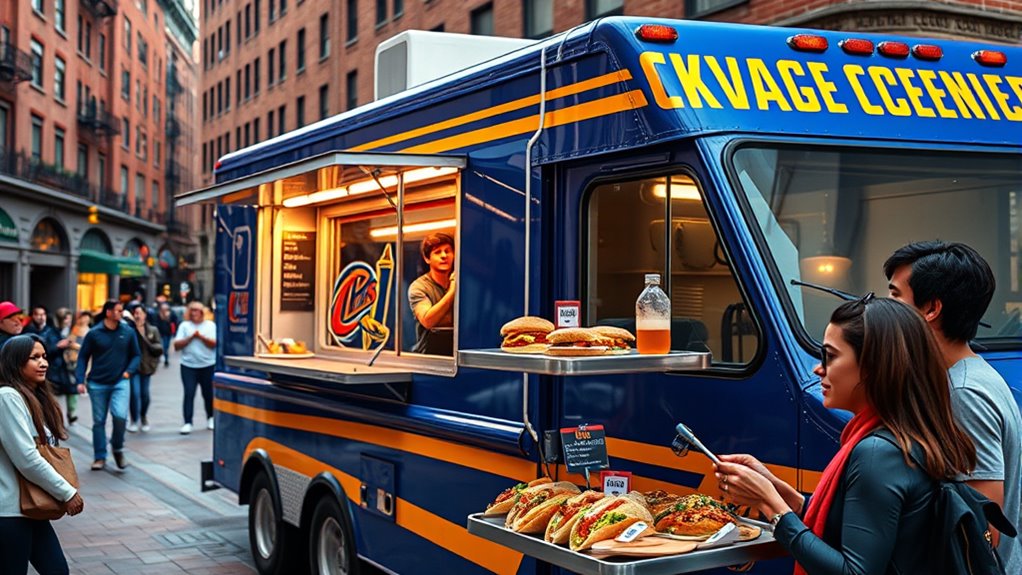
To create a successful menu, focus on dishes that highlight Cleveland’s local flavors and appeal to your target customers. You’ll need to carefully calculate ingredient costs to make certain your prices cover expenses while remaining competitive. By balancing creativity with cost-awareness, you can develop a menu that’s both appealing and profitable. Incorporating mindful planning into your menu development can also help ensure sustainable practices and reduce waste.
Crafting a Locally Inspired Menu
Creating a locally inspired menu is essential for connecting with Cleveland’s food scene and attracting loyal customers. Focus on highlighting local ingredients and regional flavors to showcase your unique offerings. Incorporate Cleveland’s culinary heritage by featuring dishes that reflect the city’s culture. To craft your menu, consider:
- Sourcing fresh, seasonal local ingredients
- Highlighting regional flavors in signature dishes
- Balancing traditional favorites with innovative twists
- Pricing items competitively while reflecting quality
Ingredient Cost Calculation Techniques
Understanding how to accurately calculate ingredient costs is essential for designing a profitable menu and setting the right prices. Start by carefully tracking your ingredient sourcing expenses, including wholesale prices and delivery fees. Conduct a thorough cost analysis for each menu item, breaking down the quantity of ingredients used and their costs. This helps you identify high-cost ingredients and find opportunities to optimize. Use this data to determine your food cost percentage, ensuring your menu prices cover expenses while remaining competitive. Regularly updating your calculations accounts for fluctuating prices and supplier changes. Accurate ingredient cost calculation enables you to price your dishes effectively, maximize profit margins, and maintain a sustainable operation for your Cleveland food truck.
Technology and Operations
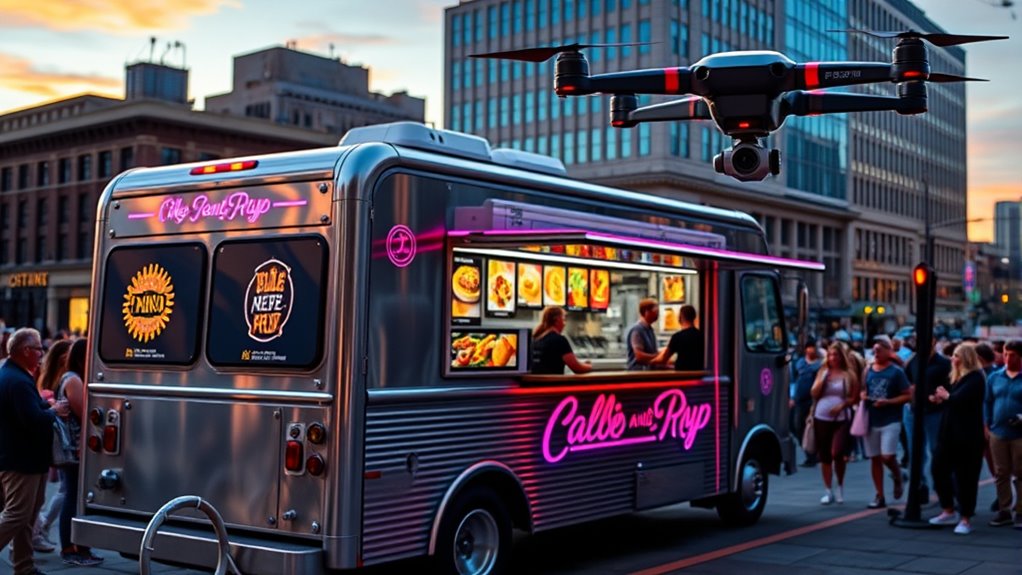
Implementing the right technology can streamline your daily operations and improve customer experience. Wireless payment hardware options make checkout quick and secure, while real-time stock tracking software helps you stay on top of inventory. Choosing the right tools guarantees your food truck runs smoothly and efficiently.
Wireless Payment Hardware Options
Choosing the right wireless payment hardware is essential for smooth operations and customer satisfaction on your food truck. Modern options like mobile card readers enable quick, secure transactions, reducing wait times. Contactless payments have become increasingly popular, allowing customers to pay effortlessly with their smartphones or contactless cards. When selecting hardware, consider these options:
- Portable mobile card readers compatible with smartphones and tablets
- Contactless payment-enabled terminals for quick tap-and-go transactions
- Integrated systems that combine payment processing with order management
- Wireless connectivity options, such as Bluetooth or Wi-Fi, for seamless operation
These choices guarantee you can accept a variety of payment methods, improve efficiency, and deliver a modern, convenient experience to your customers. Investing in reliable hardware sets the foundation for successful daily operations.
Real-Time Stock Tracking Software
Investing in real-time stock tracking software streamlines your inventory management, guaranteeing you always know what supplies are on hand. With digital inventory systems, you can monitor stock levels instantly, reducing waste and preventing shortages. These tools send automated stock alerts when supplies run low, so you can reorder promptly and keep your food truck running smoothly. Real-time updates help you avoid overstocking or understocking ingredients, saving you money and time. By maintaining accurate inventory data, you can focus on preparing quality food and serving customers efficiently. Integrating stock tracking software into your operations enhances transparency and control, making inventory management less stressful. Overall, this technology ensures you stay organized and responsive, supporting the success of your Cleveland food truck.
Marketing and Growing Your Presence
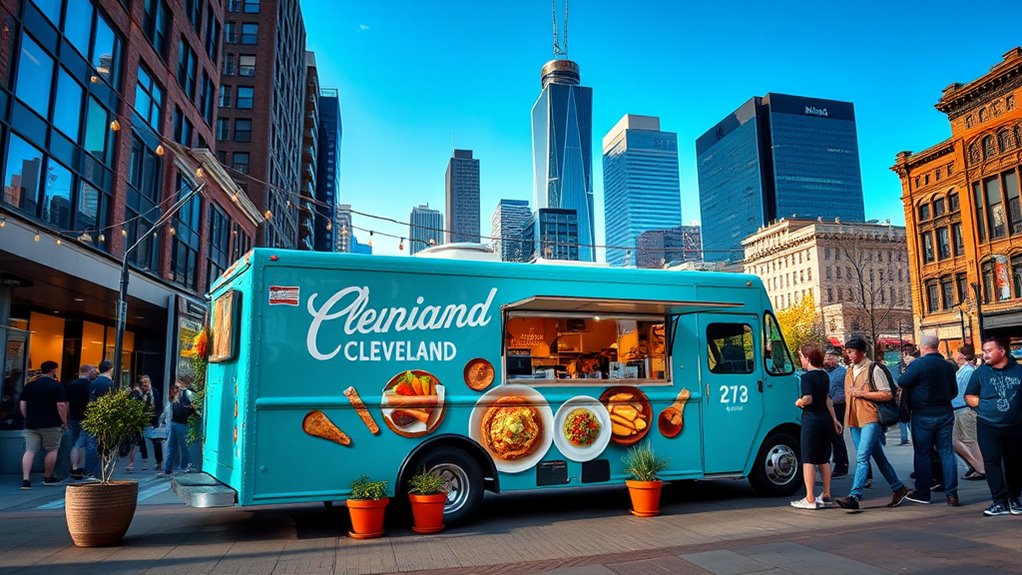
To build your presence in Cleveland, focus on the city’s popular local events where you can showcase your food. Posting eye-catching Instagram photos of your dishes helps attract nearby customers and boost engagement. By combining event participation with vibrant social media, you’ll steadily grow your following and reputation.
Popular Local Event Schedules
Aligning your food truck’s schedule with popular local events is essential for building visibility and attracting new customers. By participating in well-attended happenings, you strengthen your food truck branding and maximize your reach through strategic event marketing. Keep an eye on Cleveland’s event calendar for festivals, farmers’ markets, street fairs, and concerts. To optimize your presence, consider these opportunities:
- Food festivals and culinary events
- Seasonal farmers’ markets
- Community street fairs and parades
- Music and arts festivals
Attending these events positions your truck in front of diverse audiences, boosting brand recognition. Planning ahead ensures you secure prime spots and prepare menu items that resonate with event themes. Consistent participation in these schedules helps solidify your reputation and grow your customer base effectively.
Engaging Instagram Food Photos
Capturing eye-catching food photos on Instagram is a powerful way to attract new customers and build your brand’s online presence. Focus on good food styling by arranging your dishes thoughtfully, highlighting their best features. Pay attention to photo composition: use natural light, choose appealing angles, and keep backgrounds simple to make your food stand out. Experiment with different shots—close-ups, overheads, or action shots—to see what resonates most. Consistency in quality and style helps create a recognizable aesthetic. Don’t forget to add relevant hashtags and engaging captions to boost interaction. By honing your food styling skills and mastering photo composition, you’ll make your food truck’s Instagram account irresistible and encourage more followers to visit your truck.
Navigating Cleveland’s Food Truck Scene
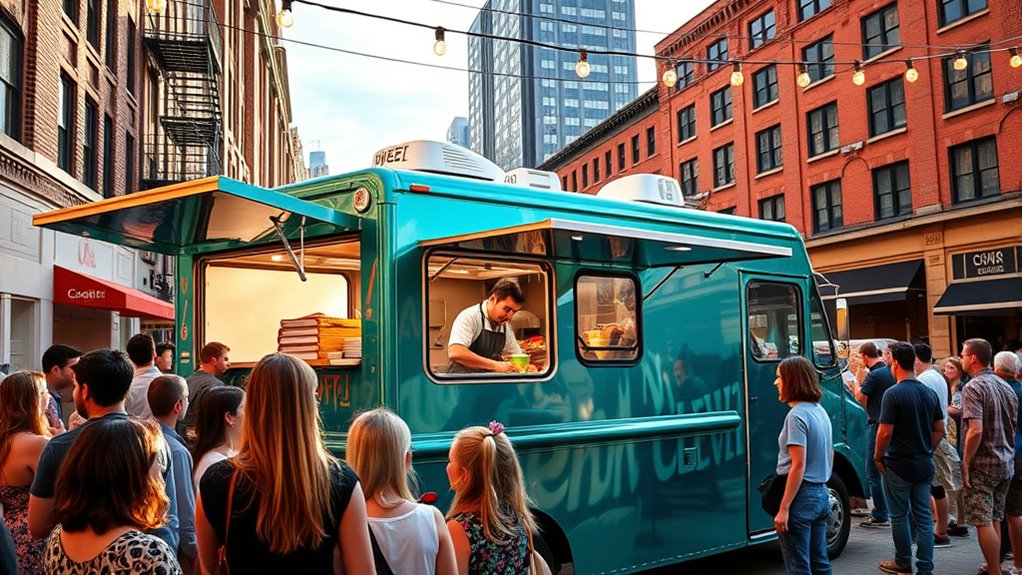
Exploring Cleveland’s vibrant food truck scene requires understanding its unique regulations and local hotspots. To succeed, you need to stay current with local policies, permits, and health codes. Engage with popular events and neighborhoods where food trucks thrive, like Ohio City or Downtown Cleveland. Keep up with culinary trends to attract customers, using innovative cooking techniques that set you apart. Collaborate with local breweries or farmers markets to boost visibility. Attend city workshops on food truck operations to stay compliant and informed.
Discover Cleveland’s food truck scene by staying compliant, engaging with local hotspots, and embracing culinary trends.
- Research Cleveland’s licensing requirements
- Identify high-traffic locations and events
- Incorporate trending ingredients and cooking methods
- Network with local vendors and community groups
Frequently Asked Questions
What Permits Are Specific to Cleveland’s Food Truck Regulations?
You need to obtain food truck licensing and health department permits to operate legally in Cleveland. The city requires a mobile food vendor license, which involves submitting an application and paying fees. Additionally, you must pass a health inspection to secure the necessary health department permits. Make sure to stay updated on local regulations, as Cleveland enforces strict standards to guarantee food safety and compliance for all food trucks.
How Do I Find the Best Locations to Park My Food Truck?
Did you know that 78% of successful food trucks prioritize high foot traffic areas? To find the best parking strategies, scout busy neighborhoods, parks, and event venues during peak hours. Focus on customer accessibility by choosing spots near public transit or popular attractions. Keep an eye on local events and build relationships with event organizers. This approach maximizes visibility and attracts more customers to your food truck.
Are There Any Local Food Trends to Consider in Cleveland?
You should focus on Cleveland regional cuisine trends like pierogis, corned beef, and locally sourced ingredients, as these resonate with residents. Keep an eye on local food startups and community events, which often showcase popular dishes and new flavor ideas. Incorporate these trends into your menu to attract customers enthusiastic for authentic Cleveland flavors, and stay flexible to adapt as local tastes evolve.
What Insurance Coverage Is Required for Food Trucks in Cleveland?
Think of your food truck as a well-oiled machine—you need the right insurance coverage to keep it running smoothly. In Cleveland, you’re required to have general liability insurance, vehicle insurance, and food safety coverage. Make sure to also consider coverage for vehicle maintenance and food safety to protect against accidents or illnesses. Staying covered helps you serve delicious food confidently while steering through local regulations smoothly.
How Can I Partner With Local Events and Festivals?
You can partner with local events and festivals by offering event sponsorship opportunities, which boost your visibility and credibility. Reach out to organizers early to discuss community collaborations that align with your food truck’s brand. Attend local event planning meetings, provide samples or discounts, and build relationships with community leaders. These strategies help you secure prime spots, attract new customers, and integrate your food truck into Cleveland’s vibrant event scene.
Conclusion
Starting your food truck journey in Cleveland is like steering a ship through uncharted waters—you’ll face challenges, but with passion and preparation, you’ll find your course. Embrace the local scene, stay adaptable, and let your unique flavor set sail. As you navigate the city’s busy streets, remember that every stop is a new opportunity to grow. Keep your eyes on the horizon, and soon, your food truck will become a beloved fixture in Cleveland’s vibrant culinary landscape.
